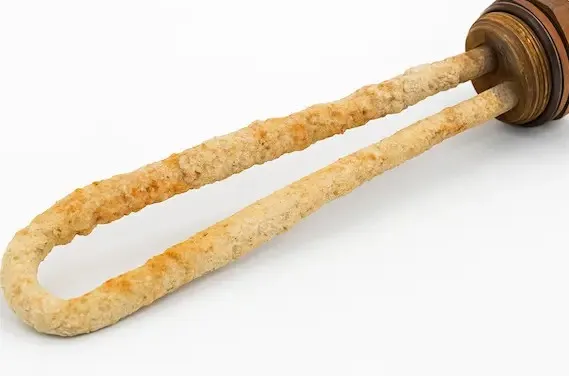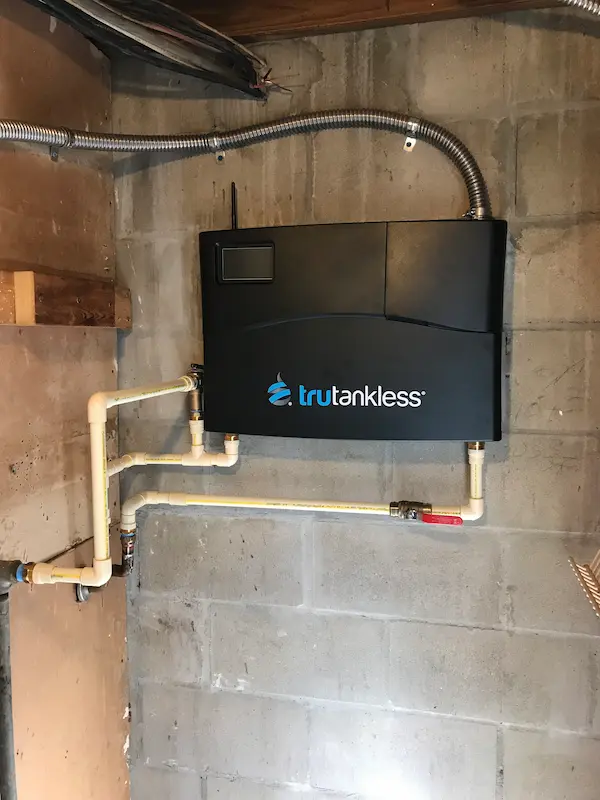Fortunately, at EVERYDAYPLUMBER.com, we routinely handle resulting plumbing issues caused by hardened or calcareous water. By understanding how hard water impacts your plumbing, scheduling proper maintenance routines, and paying attention to early warning signs, you can prevent expensive repairs down the road.
What Is Hard Water?
If the water from your tap is “hard” water that simply means that it contains higher levels of dissolved minerals—mainly calcium and magnesium.
While these minerals are not harmful to your health, but they can wreak havoc on your plumbing system over time. This is particularly true for your water heater.
Whether your water comes from municipal sources or private wells, Tampa’s water supply is naturally mineral-rich. This means homes across the region are especially prone to issues like scale buildup, reduced water heater efficiency, and long-term plumbing damage.
How Mineral Heavy Water Damages Your Water Heater
Water heaters are built to handle clean water. Which does not mesh well with mineral-rich supplies like what’s commonly found in Tampa. As a result, when excess minerals are present, they gradually compromise the performance and lifespan of your unit.
Sediment Accumulation
As water is heated, minerals like calcium and magnesium separate and settle at the bottom of the tank. Resulting buildup creates a thick, insulating layer that forces the system to work harder to heat the water.
The result: Reduced efficiency, increased energy bills, and added strain that wears out the unit faster.
Heating Element Damage
In electric models, mineral deposits often cling to the heating elements. These layers block heat transfer, causing the elements to overheat or burn out entirely.
Watch for this: Inconsistent water temperature or lukewarm water can be a sign that the elements are coated in scale.
Lower Water Pressure and Blocked Plumbing
Calcareous water affects more than just your water heater. It also causes mineral buildup in pipes and fixtures. Over time, this accumulation restricts water flow and leads to reduced pressure throughout your home.
Warning Sign: If you notice gradually decreasing water pressure, scale buildup inside your plumbing may be to blame.
Rust, Corrosion and Leaks
Heavy mineral exposure wears away the tank’s protective lining, accelerating rust and corrosion. Once corrosion sets in, the tank becomes vulnerable to leaks—and full system failure.
The consequence: A compromised tank often means replacement, and ignoring early signs could lead to costly water damage in your home.
Protecting Your Water Heater from Hard Water
Tampa’s hard water is not going away. However, we offer effective solutions for dealing with it. Employing these strategies can drastically increase the life of your water heater and overall plumbing system.
Schedule Routine Water Heater Maintenance
Annual or semi-annual water heater maintenance helps flush out sediment and keeps your unit running at peak efficiency. At EVERYDAYPLUMBER.com, our expert plumbing technicians offer professional water heater maintenance for Tampa residences and homes in surrounding areas.
Install a Whole-Home Water Filtration or Softening System
Filtration systems and water softeners remove calcium and magnesium from your water before it reaches your appliances. Not only does this protect your water heater, but also it improves the lifespan of the piping that delivers water throughout your home.
Consider a Powered Anode Rod, Such as Corro-Protec
Traditional water heaters use a sacrificial anode rod to prevent corrosion. But a Corro-Protec powered anode rod is a modern alternative that provides active protection through electrical current rather than chemical reactions.
How It Works:
The Corro-Protec rod is installed at the top of the tank and is connected to a power source. It emits a low-voltage current that creates a protective barrier along the tank’s interior walls. This current neutralizes the corrosive effects of minerals and extends the life of the water heater.
Benefits of the Corro-Protec Powered Anode Rod:
- Prevents internal tank corrosion
- Helps reduce mineral buildup and sediment
- Eliminates odors caused by sulfur or bacteria
- Requires no maintenance or regular replacement
- Comes with a 20-year warranty for long-term protection
Pro Tip: Corro-Protec is an ideal upgrade during new installations or as a retrofit for water heaters affected by Tampa’s mineral-laden water conditions.
Call the Tampa Water Heater Experts Today
Hard water can silently damage your water heater and plumbing system over time. Don’t run the risk of a potential disaster; take action today to preserve the plumbing quality of your Tampa home.
Protect your investment and improve your water quality with help from the experts at EVERYDAYPLUMBER.com.
Call 813-872-0200 or request your service online. We provide fast, affordable water heater repairs, maintenance, and upgrades throughout the Tampa Bay area.
Check out our 5-star reviews on our Google Business Profile. Discover why we’re one of the most trusted plumbing companies in the Tampa Bay Area.
Let us help you extend the life of your water heater and keep your plumbing running smoothly, even with Florida’s mineral-rich water conditions.
Frequently Asked Questions About Hard Water in The Tampa Bay Area
Q: What causes mineral-heavy water and is it safe to use?
Due to Florida’s geological makeup, the water sourced for residents is naturally mineral-rich. Water that contains elevated levels of dissolved minerals like calcium and magnesium is generally safe for consumption. However, over time, it can harm the efficiency of plumbing systems, water heaters, and appliances due to scale accumulation.
Q: How do I know if my home’s water supply has excess mineral content?
Telltale signs include chalky residue on faucets, stiff laundry, dry skin or hair after showers, and dishes that appear cloudy even after washing. If you’re in the Tampa Bay area, this type of water is extremely common due to the local groundwater composition.
Q: What impact does mineral-laden water have on my water heater?
Over time, sediment buildup forms inside the tank, often coating the heating elements. This reduces energy efficiency, increases heating time, and can lead to premature failure of the unit if not addressed.
Q: Can a high mineral content in water damage my plumbing?
Yes. Over time, deposits can accumulate in pipes, leading to reduced flow, clogged fixtures, and added strain on your plumbing system. This kind of buildup is a frequent culprit behind low water pressure and recurring leaks.
Q: What are the best ways to deal with mineral-rich water in my home?
Installing a filtration or water softening system is the most effective long-term solution. Routine maintenance—like flushing your water heater annually or semi-annually—can also help minimize damage and extend the life of your plumbing equipment.
Related Content:
Water Heater Repair – Need a repair, replacement, or upgrade? Find out more about how we do it all!
How to Maintain Your Water Heater and Extend Its Lifespan – Interested in being proactive in preserving the health of your plumbing? Learn more here!
5 Household Plumbing Tips from the Best Plumbers Around – Get good quality plumbing information from superior plumbing experts in Tampa Bay!




